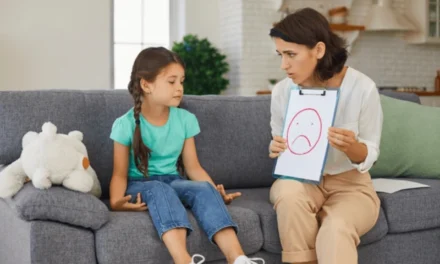Parenting teenagers is often seen as a difficult challenge, filled with conflicts, mood swings, and growing pains. But it doesn’t have to be this way. Through peaceful parenting teenagers with grace, you can build a more harmonious relationship with your teen and guide them through this crucial phase of life. Using patience, empathy, and understanding, peaceful parenting focuses on mutual respect and open communication, helping teenagers grow into responsible, confident young adults.
This comprehensive guide offers 12 effective tips for peaceful parenting teenagers that will help you create a supportive and loving environment for your teen while maintaining essential boundaries and discipline.
Understanding the Teenage Brain: The Key to Peaceful Parenting Teenagers
One of the most important aspects of peaceful parenting teenagers is understanding what’s happening in their developing brains. The teenage brain undergoes dramatic changes that affect behavior, emotional regulation, and decision-making. The prefrontal cortex—the area of the brain responsible for reasoning, impulse control, and understanding long-term consequences—is still developing during the teenage years, while the amygdala, which processes emotions, is fully active. This biological imbalance explains why teenagers often act impulsively or react emotionally to situations.
For peaceful parenting teenagers, it’s critical to recognize that your teen is not just being rebellious or irrational on purpose. Instead, they are navigating complex emotional and psychological changes. By approaching your teen’s behavior with empathy and understanding, you can foster a relationship that’s based on support rather than conflict.
When faced with an emotional outburst, try to remember that your teenager is working through these challenges in real-time. Respond with calmness and patience, saying, “I understand you’re upset; let’s talk about it.” This approach de-escalates tension and reinforces that you are there to help them manage their emotions in a constructive way, making peaceful parenting teenagers easier and more effective.
Open Communication: Building Trust in Peaceful Parenting Teenagers
At the heart of peaceful parenting teenagers is open, honest communication. Establishing a safe environment where your teen feels they can talk to you without judgment is crucial. Many conflicts between parents and teens arise from misunderstandings or a lack of communication. By fostering a home where conversation flows freely, you build trust and make it easier for your teenager to come to you with their thoughts, concerns, or problems.
Here’s how to promote open communication as part of peaceful parenting teenagers:
- Be present: Make time for meaningful conversations with your teen, whether it’s during dinner, while driving, or before bed. These moments show your teen that you care and are available to listen.
- Listen without judgment: Sometimes, teens just need someone to listen without offering advice or criticism. Let your teen vent their frustrations without immediately jumping in to solve the problem. Show that you understand by validating their feelings with responses like, “That sounds really tough. I’m here if you want to talk more about it.”
- Encourage dialogue: Ask open-ended questions that encourage deeper conversations. Instead of asking “How was your day?” try “What was the best part of your day?” or “Did anything surprise you today?”
By fostering an environment of open communication, peaceful parenting teenagers becomes less about correcting behavior and more about understanding the root of your teen’s emotions and actions. This builds a foundation of trust and respect, helping to avoid misunderstandings and conflict.
Setting Boundaries with Empathy: The Core of Peaceful Parenting Teenagers
Boundaries are essential when peaceful parenting teenagers, but how you set and enforce those boundaries can either strengthen or weaken your relationship with your teen. The goal is to strike a balance between allowing freedom and ensuring safety, while also respecting your teen’s growing independence.
When establishing rules, involve your teen in the process. Explain the reasons behind the rules and allow them to express their thoughts or concerns. This collaborative approach makes your teen feel respected and more likely to follow the rules because they understand the logic behind them.
For example, instead of dictating a curfew, you might say, “I’d like you to be home by 10 PM because I worry about your safety when you’re out late. How do you feel about that?” This opens up a conversation where your teen can share their perspective, and you can both agree on a compromise if necessary. This method promotes peaceful parenting teenagers by focusing on mutual respect and understanding.
- Be consistent: Once rules are in place, it’s important to enforce them consistently. Inconsistency can confuse teens and lead to power struggles.
- Explain consequences: Make sure your teen knows the consequences of breaking the rules. However, the focus should be on teaching, not punishing. For instance, instead of grounding your teen indefinitely for missing curfew, you could say, “Because you came home late, you’ll need to help with extra chores this weekend.”
Setting boundaries with empathy and consistency ensures that your teen understands the importance of rules while also feeling respected, which is a key component of peaceful parenting teenagers.
Modeling Respectful Behavior
Teenagers learn a lot from observing their parents. If you want to encourage respectful behavior in your teen, it’s essential to model that behavior yourself. Peaceful parenting teenagers is about showing your teen how to handle stress, conflict, and disappointment with grace and maturity.
- Manage your stress effectively: When faced with stressful situations, demonstrate how to cope in healthy ways. If your teen sees you becoming frustrated but managing your emotions, they will learn to do the same.
- Resolve conflicts peacefully: When disagreements arise—whether with your teen, your partner, or others—handle them calmly. Avoid yelling, name-calling, or belittling. Instead, speak respectfully and listen actively to the other person’s perspective.
- Apologize when necessary: If you lose your temper or make a mistake, apologize. This shows your teen that even adults aren’t perfect and that owning up to mistakes is part of being respectful.
By modeling these behaviors, you set an example for your teen to follow, making peaceful parenting teenagers a more natural process. Your teen is more likely to respond to conflict and stress with calmness and respect when they’ve seen you handle challenges in the same way.
Encouraging Independence with Support

Teenagers naturally crave independence as they move through adolescence, but they also still need parental guidance. Peaceful parenting teenagers means finding the balance between allowing them to make their own choices and being there to support them when they need it.
Encouraging independence while offering guidance creates a safe environment for your teen to explore their autonomy while knowing that they have a safety net.
- Allow decision-making: Give your teen the opportunity to make their own choices about certain aspects of their life, such as managing their time, choosing friends, or deciding on extracurricular activities. Let them experience the consequences of their decisions—whether good or bad—while offering guidance when necessary.
- Be a source of support: When your teen makes mistakes, use the experience as a teaching moment. Instead of saying, “I told you so,” try “What can you learn from this situation?” This encourages personal growth and helps them build problem-solving skills.
- Gradually increase responsibilities: As your teen demonstrates responsibility, allow them more freedom. This could include extending their curfew, giving them a bigger allowance to manage, or letting them take on more household duties.
By fostering independence with a supportive approach, you enable your teenager to build confidence in their decision-making abilities, which is an essential element of peaceful parenting teenagers.
Managing Defiance with Calmness and Grace

Defiance is a common behavior during adolescence as teens seek to assert their independence. However, defiance can often lead to power struggles between parents and teenagers. Peaceful parenting teenagers requires staying calm in the face of defiance and understanding that this behavior is often a sign of deeper frustration or unmet needs.
Instead of reacting with anger when your teen challenges your authority, try these strategies:
- Stay calm: Reacting with anger or frustration will only escalate the situation. Take a deep breath and approach the situation with a calm demeanor. Say something like, “I understand you’re upset. Let’s talk about this when we’re both feeling calmer.”
- Focus on the behavior, not the person: When addressing defiant behavior, separate the action from the person. Instead of saying, “You’re being disrespectful,” try, “I don’t appreciate the way you spoke to me. Let’s work on how we can communicate better.”
- Offer choices: Sometimes, teens act out because they feel a lack of control. Giving them choices within set boundaries can help reduce defiance. For example, instead of saying, “You have to do your homework now,” try “Would you prefer to do your homework before or after dinner?”
By managing defiance with calmness and offering solutions, you maintain a peaceful and respectful relationship, which is the cornerstone of peaceful parenting teenagers.
Encouraging Emotional Expression

Teenagers often struggle with intense emotions, and part of peaceful parenting teenagers involves helping them navigate these feelings in healthy ways. Encouraging your teen to express their emotions can prevent them from bottling up frustrations, which can lead to emotional outbursts or withdrawal.
- Normalize feelings: Let your teen know that it’s okay to feel angry, sad, or frustrated. Say things like, “It’s normal to feel upset when things don’t go as planned. How can I help?”
- Teach coping strategies: Help your teen develop healthy ways to cope with difficult emotions, such as deep breathing, journaling, or talking things out with a trusted friend.
- Be a listening ear: Encourage your teen to talk about what they’re feeling, even if it’s hard. Let them know that you’re there to listen without judgment.
By fostering emotional intelligence, you give your teen the tools they need to handle life’s challenges, making peaceful parenting teenagers a smoother process.
Providing Consistent Support

Consistency is key to peaceful parenting teenagers. Teens need to know that they can rely on you, even when they make mistakes. Providing steady, unwavering support helps build a secure foundation for your teen to navigate the ups and downs of adolescence.
- Be present: Show up for your teen, whether it’s by attending their events, being available to talk, or simply checking in on how they’re doing. Your consistent presence reassures them that you’re always there for them, no matter what.
- Encourage independence but stay engaged: While it’s important to let your teen handle more on their own, stay engaged in their life. Ask about their friends, interests, and schoolwork. Show that you’re invested in their well-being without being overbearing.
- Offer unconditional love: Make sure your teen knows that your love is not conditional on their behavior or achievements. This foundation of love helps them feel secure, even when they mess up.
Consistency in love, support, and guidance makes peaceful parenting teenagers more effective, as your teen knows they can count on you during good times and bad.
Avoiding Power Struggles
Power struggles between parents and teens are common, but they often lead to resentment rather than resolution. Peaceful parenting teenagers means recognizing that engaging in a battle for control will only harm the relationship.
- Offer choices: Giving teens some control over their lives can reduce the likelihood of power struggles. For example, instead of demanding that they clean their room now, offer, “Do you want to clean your room before dinner or after?”
- Stay calm: When a conflict arises, maintain your composure. Engaging in a shouting match rarely leads to positive outcomes. Instead, take a deep breath and suggest discussing the issue later when both of you are calmer.
- Find compromises: Work with your teen to find solutions that meet both of your needs. Compromise shows respect for their growing independence while still maintaining parental authority.
Avoiding power struggles and focusing on collaboration fosters a more peaceful home environment, making peaceful parenting teenagers more manageable.
Practicing Patience
Peaceful parenting teenagers requires a great deal of patience. Teens are going through significant changes and are bound to make mistakes, test limits, and challenge authority. Maintaining patience through these challenges is essential for maintaining a positive, supportive relationship.
- Take deep breaths: When frustrations rise, take a moment to breathe and collect yourself before responding. This pause can prevent you from saying something you might regret.
- Remember the long-term goal: Remind yourself that parenting a teen is about guiding them toward adulthood, not controlling their every move. Patience is crucial in helping them learn and grow.
- Celebrate small victories: Even small steps toward responsible behavior should be celebrated. Positive reinforcement helps encourage continued progress.
By practicing patience, you demonstrate grace and understanding, which is at the heart of peaceful parenting teenagers.
Offering Unconditional Love
At the core of peaceful parenting teenagers is offering unconditional love. Teenagers need to know that no matter how many mistakes they make or how difficult things get, your love for them is unwavering. This sense of security helps them grow into confident, independent adults.
- Express love regularly: Make it a habit to tell your teen that you love them, especially after difficult conversations or conflicts.
- Show love through actions: Your actions often speak louder than words. Spend quality time with your teen, support their interests, and be there when they need you.
- Reassure them after conflicts: After an argument or disagreement, remind your teen that your love is not conditional on their behavior. This helps maintain trust and closeness.
Unconditional love is the foundation of peaceful parenting teenagers, giving them the confidence to face life’s challenges.
FAQs on Peaceful Parenting Teenagers
How can I encourage my teen to talk to me more openly?
Encouraging open communication starts with creating a safe, non-judgmental space where your teen feels comfortable sharing their thoughts. Practice active listening, and be present in the conversation without offering immediate solutions.
What should I do when my teenager refuses to follow rules?
When your teen refuses to follow rules, avoid escalating the situation with anger. Instead, stay calm, address the behavior respectfully, and discuss the consequences in a way that focuses on learning rather than punishment.
How do I set boundaries without causing resentment?
To avoid resentment, involve your teen in the rule-making process. Explain the reasons behind the rules and be open to compromise. This collaborative approach fosters mutual respect.
What should I do if my teen is constantly stressed?
If your teen is constantly stressed, recognize the signs and offer support. Encourage healthy coping mechanisms like mindfulness, exercise, or talking through their feelings. Create a safe space for them to express what’s bothering them.
Can peaceful parenting work with rebellious teenagers?
Yes, peaceful parenting can be very effective with rebellious teenagers. By fostering open communication, staying calm during conflicts, and setting empathetic boundaries, you can build a respectful relationship that helps guide your teen through difficult phases.
How do I handle my teenager’s emotional outbursts?
Handling emotional outbursts involves staying calm, validating their feelings, and offering space for them to cool down. Once they’re calm, engage in a constructive conversation about how to manage emotions in the future.
Conclusion: The Path to Peaceful Parenting Teenagers
Peaceful parenting teenagers with grace involves fostering open communication, setting empathetic boundaries, and providing unconditional love and support. By understanding the challenges your teen faces, such as changes in their brain and emotions, you can guide them through adolescence with patience and compassion. Remember, the teenage years are a time of growth, and with the right approach, you can transform these years into an opportunity for deeper connection and mutual respect.
By applying these 12 tips for peaceful parenting teenagers, you’ll strengthen your relationship with your teen, create a more peaceful home environment, and help them grow into the confident, independent adult you know they can be.






Trackbacks/Pingbacks